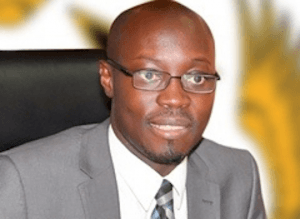Ghana sheds $10b off public debt following appreciation of cedi – Forson

The Ghana government has shed $10 billion off its public debt following the appreciation of the Ghana cedi against the US dollar.
Speaking at a media orientation workshop in Accra, Mr. Cassiel Ato Forson, a Deputy Minister of Finance said looking at the exchange rate since the appreciation of the cedi in the last week, he said looking at the numbers, it would be seen that the government is ‘reducing public debt’.
He indicated that from 2012 to 2014 the primary fiscal deficit has reduced to 4 per cent of GDP.
He said the government was aiming at reducing the primary deficit to .3 per cent of GDP and by the end of 2016, the government expects to see primary surplus of 5 per cent.
The Deputy Minister said in the first quarter of 2015 the country experience negative growth of 3.9 per cent, but after the revision of the economic indicators the country is geared towards a positive growth of 4.9 per cent.
According to Mr. Forson, domestic tax revenue ration to GDP was 15 per cent and government was aiming at attaining a tax revenue ration to GDP of 18.8 per cent, and he believes that this would help the private sector.
Making a presentation, Mr. Wisdom Adongo of the Private Enterprises Federation (PEF) stated that the biggest challenge to the private sector is the public sector.
“There is little or no recognition of the private sector in the development process,” he said.
Mr. Adongo argued that the private sector investments have higher multiplier effects than public sector investments.
He expressed displeasure with the tendency of government outsourcing projects to foreign companies when local companies could do the same job, and blamed government bureaucracy and delays in issuing permits for business operation.
According to him, permit issuing agencies do not have most of the resources they need to issue permits, he gave the example of some of these agencies lacking paper to print permits.
He raised issues with lack of enforcement of regulations to facilitate the private sector and corruption in the sector.
He decried what he called the negative business environment such as high interest rates, balance of payment issues, inflation and huge government borrowing which has crowded out the private sector.
He also noted the weaknesses within the private sector such as lack of capacity and incompetence in management and lack of respect for contracts.
Mr. Adongo however, said the African Development Bank (AfDB) and the PEF are developing a database for the private sector in Ghana.
Mr. Sulyemana Koney of the Ghana Chamber of Mines following the fall in world price of gold, Ghana’s mineral revenue dropped 14 per cent and production also fell.
“These are difficult times for mining companies as they try to survive,” he said.
He noted that even though Ghana is the leader in mining in West Africa, the country has been unable to take advantage of the supply chain to be able to go into other areas of the economy – especially the production of caustic soda.
According to him, the Chamber brought a company into the country to produce caustic soda locally but because of the lack of electricity, the company pulled out. He therefore urged the government to work with the private sector to improve the power situation in the country.
He called on the government to collaborate with mining companies to improve rail transport in the country so as to enable mining companies cut costs in transportation.
The Minister of Trade, Spio-Garbrah called on the Chamber of Mines to contact the Ministries to discuss opportunities.
He also notes the complex nature of dealing with the media as plurality has led to a large number of media organizations in the country.
Mr. Affail Monney, President of the Ghana Journalists Association (GJA) commenting on the purpose of the orientation workshop said “We want as media to undertake an introspection of our coverage of the private sector, evaluate our ability and strategise on how we can make our coverage of the private sector much more comprehensive and effective.”
He pointed out the lack of follow-ups concerning matters of the private sector.
“Some have said if only the media could give a quarter of the time they devote to politics to business, finance and economic issues and matters concerning the developments in the private sector, Ghana’s development would have been placed on a much sounder footing,” he said.
The Workshop was under the theme “Using the Media to raise comprehensive Coverage of Challenges Facing the Ghanaian Private Sector.”
By Emmanuel K. Dogbevi
